Today, when the Internet contains millions of terabytes of information, there is no way to do without search engines. After all, it is very important for all of us to get to the necessary data as quickly as possible. But do our dear readers know exactly how the search engines translate the search string characters in code? Do you realize that all requests instantly go to the marketing departments of corporations?
Let's go into a Google search and see how it displays a link to a site, for example, whoer.net:
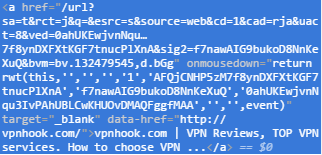
And this is how Yandex does it:
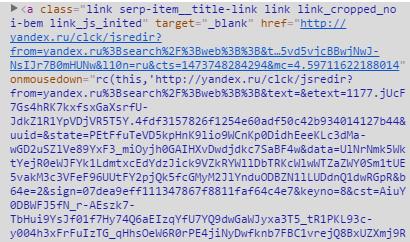
As you can see, it is not very obvious. Actually, this was done on purpose, and a set with a symbol is nothing more than a script that processes a “click” on a link and remembers the user's action.
Today on our site we will talk about anonymous search engines that do not "pollute" the search with unnecessary scripts and do not store data about your search queries.
DuckDuckGo.com Safe Search Site
The most popular anonymous search tool to date is DuckDuck, which in anonymous browser assigned by the default search tool. DuckDuck is also available for selection in firefox browsers and Opera. A private search engine is famous for not using scripts in links and not displaying advertising and viral sites in search results. DuckDuckGo allows the user to specify special characters and symbols in the request. And, as we already said, the search engine does not follow user actions.
As you can see, there are no hidden behavioral scripts, but there is only a direct link!
Another positive point in the DuckDuckGo system is its full support for the https protocol. So far, this setting is turned off at the first request of the user, but it is easy to activate it through the convenient main menu of the search engine. After performing this action, the entire search will go through additional encryption.
Anonymous IxQuick Search Engine
The most confidential search engine to date is IxQuick. The servers of this search engine are “equipped” with the most powerful metasearch engine. This means the following: after a search query, IxQuick gives the results immediately from a dozen search engines, combining them in its search box and assigning each link a unique rating by which the ranking takes place. Despite all the production capacities, there is no “tracking” of users; moreover, the IP addresses of users are not even recorded. Nevertheless, each user can allow saving the settings of his search on the server of an anonymous search engine in the form of cookies, which will either be deleted in auto mode once every three months, or updated every time I enter the main page of IxQuick.
Of the minuses of this anonymous system, only the fact of the lack of the Russian language in the interface can be noted.

Today we’ll talk about the best anonymous search engines for the regular Internet, the so-called Clearnet, which everyone uses.
I will tell you about all the existing search engines that offer the user more anonymity and privacy than the popular and well-known search engines.
In the beginning we will talk about key points choosing an anonymous search engine. You will learn what to pay attention to a user who does not want to leave traces on the network. After that there will be an overview of each individual search engine.
We will also analyze situations in which it is better to use an anonymous search engine, and when it is preferable to use the usual Yandex, Google and Bing.
Anonymous search engine
- Foreword
- Search Engine Security
- Search Engine Anonymity
- Anonymous Search Engines
- Duckucko go
- Ixquick
- Startpage
- eTools.ch
- Privatelee
- Other anonymous search engines
- Conclusion
Search Engine Security
A secure search on the Internet begins with an encrypted transmission of the request between the user and the server. To check the encryption, I used the excellent SSL Server Test tool. I ran all the search engines through it and revealed the obvious outsiders of our review.
Why are outsiders?
Because a search engine that positions itself as anonymous and secure should first of all automatically force a secure SSL connection.
To do this, enter “https” in the address bar of the eTools search engine manually. In search of YaCy - activate the use of the secure HTTPS protocol in the settings. And other than DuckDuckGo, Startpage Ixquick with this case is even worse.
The same Google and Yandex have no such problems. In general, in terms of security and encryption of requests there are no equal to Yandex and Google.
Another important criterion is the length of the encryption key. The longer the better. DuckDuckGo did its best with 4096-bit RSA encryption. Its competitors use keys half as long. But even they will be considered safe for a long time.
You should also pay attention to PFS. This option is even more important than the length of the encryption key. For those who are not in the know, PFS (Perfect forward secrecy) translates as perfect direct secrecy. In simple words PFS is a write protection of an encrypted session by special services and hackers.
Search Engine Anonymity
This is all about security. And now about anonymity. Unlike Google, Yandex and others, where all your requests are stored, processed and analyzed, anonymous search engines do not store your Internet activity.
By the way, you can see all your queries in Google using the service "". There you can find your other traces left on the network. Saved in the same way.
Well, and finally about cookies i.e. Cookies. Persistent cookies in anonymous search engines are only saved if changed standard settings - for example, if the DuckDuckGo interface language or the Ixquick interface theme is installed. None of the alternative anonymous search engines uses a user ID in cookies.
And Google does this with every request. To process the IP address, it dynamically resorts to the help of numerous persistent cookies with ID to accurately identify the user. What did you think?
Yacy Anonymous Search Engine
Ixquick Anonymous Search Engine
That's all, friends! Trusted Anonymous search system - A tool that should be at hand for every advanced network user.
Special thanks for helping the regular reader of our site and my good friend D1m0n. And of course, thanks for your likes!
In the article "Search in Tor" we already talked about top search engines for hidden internet. Today we’ll talk about the best anonymous search engines for the regular Internet, the so-called Clearnet, which everyone uses. I will tell you about all the existing search engines that offer the user more anonymity and privacy than the popular and well-known search engines. In the beginning, we will talk about the key points in choosing an anonymous search engine. You will learn what to pay attention to a user who does not want to leave traces on the network. After that there will be an overview of each individual search engine. We will also analyze situations in which it is better to use an anonymous search engine, and when it is preferable to use the familiar ...
User rating: 4.5 (35 ratings)For me, the most amazing thing about the Yandex search engine is that a huge number of people still use it. My acquaintance with the Internet, like most at that time, began through the search engine Yandex. At that time there were many popular search engines, including Russian ones. I searched for what I needed with the help of different search engines and for a long time my empirical experience confirmed that if Yandex did not find something, then others certainly would not find anything useful on this request. I also liked the Yandex slogan that "Yandex is not the Internet censor, but its mirror." It was meant that Yandex does not filter the issuance, even if some of its results are not liked by someone.
At that time it was commonplace to reach up to 7 and up to 11 pages of issuance, etc. either Runet was still small, or search engines worked so-so. This is now the vast majority rarely for any query comes at least on the second page of search results.
Some time later, I noticed that Google caught up with Yandex in terms of the quality of search results. But I continued to use Yandex even when I realized that Google was better. The thing is the conservatism inherent in most people: I had mail on Yandex, and in general there are some concerns about the changes in people. In general, I decided and completely switched to search from Google, and after a couple of weeks, my fears about the transition began to seem naive and ridiculous.
Sometimes I come back, “test” search results Yandex and only once again convinced how I was right, stopping using it. Runet, through the eyes of Yandex, some pocked, incomplete, with some skewed priorities.
Some time ago, it’s hard to say when exactly, but Google also ceased to cause a feeling of complete satisfaction. Those. overwhelmingly, Google is perfect and gives exactly what you need in the very first positions. But when searching, for example, movies or something else counterfeit, Google censors the delivery. Google reports this directly on the SERP page. This, as well as the constant "Google monitors users" has always been pushed to experiment with other search engines.
I began my article with the fact that most of us are very conservative and very reluctant to change our habits. Today, judging by the number of clicks to my sites, there are very few duckduckgo.com users. Someone simply does not know about its existence, someone tried it before and did not like it. It's time to try something new. Everyone who wants to look at the Internet (Runet) with a clean, uncomplicated censorship or delusional "ranking" look, I invite you to try the DuckDuckGo search engine, the main slogan of which, among other things, is "A search engine that does not track you."
The system contains many different interesting settings, you can find them on this page.
Users search thousands of websites daily for information. Many of them do not even suspect that there is a network within the network. The Deep Web contains information about communities that do not want to attract the interest of the authorities.
To get into closed network nessesary to use . Before you start searching for information of interest, you need to take care of your security and anonymity, for this it is important to correctly configure Tor. This can take 10-15 minutes. After carefully setting up the web browser, you can start Thor and search for the necessary sites.
Search Network Tor
Each user who wants to penetrate the "deep Internet" should know 3 features of the search, which are radically different from the work of a regular search system:
- In most cases, there are no backlinks between onion sites;
- Each site located in the "dark network" periodically changes the address;
- It takes time to view the contents of the entire site, since the Thor browser is slower than the usual Internet browsers.
It is important to take into account the fact that among web sites there may be a resource created by special services. This is done in order to calculate the criminal gangs. Therefore, you need to be very careful when visiting a particular resource of the "deep network".
Search Engines Tor
There are thousands of websites on the deep web that contain useful information. The user cannot know all Russian or English resources. That is why it is enough to find out the address of the search engine, and then it will be possible to find any information of interest.
Candle Search Engine
One of the popular deep web search engines is Candle. The search engine is located at: "gjobqjj7wyczbqie.onion". After opening the page, users will see a redone Google search.
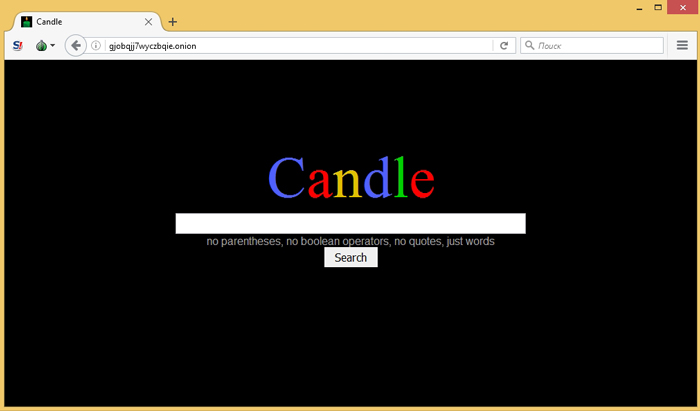
It is noteworthy that the search engine is able to issue both Russian-language and English-language queries. In general, the website operates as a familiar search engine for the user.
Ahmia Search Engine
The website was developed by one nonprofit organization that supports a deep network and projects such as Tor2Web and Globaleaks. The search engine is available at msydqstlz2kzerdg.onion.
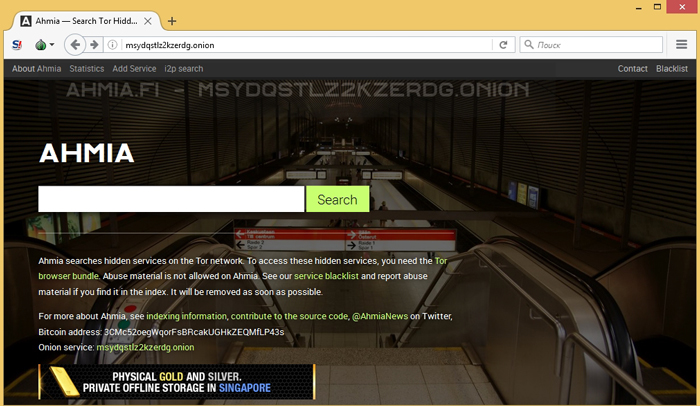
The advantage of the search engine is that it is available not only on the “deep Internet”. Users can access the website using a regular browser. As in the above search engine, Ahmia allows you to enter Russian-language queries.
Search Engine not Evil
A pretty good search engine that allows you to search for any tor sites. Externally, the website is unremarkable. The “not Evil” resource is located at “hss3uro2hsxfogfq.onion”.
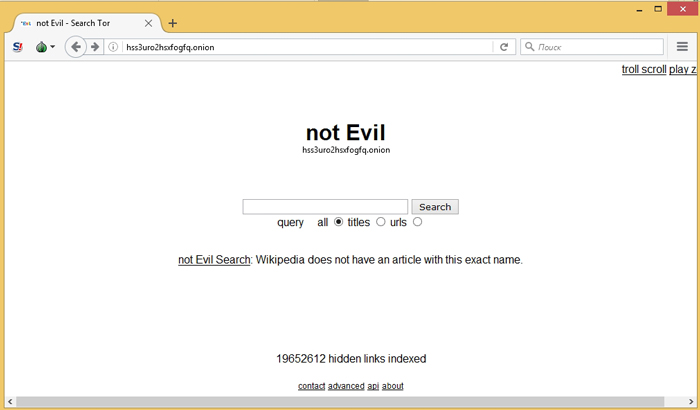
Search Torch
Torch is a good resource hosted on the Tor network. The search engine has a large database of indexed web pages. The resource is located at: "http://xmh57jrzrnw6insl.onion/". On the home page There is a search bar and advertising.

According to statistics, the resource managed to index more than a million web pages. In general, the search engine is not bad, but sometimes you can notice "slowdowns". Another disadvantage can be considered search results, namely in the first place sometimes are small, more recently created resources.
Tor Network Directories
First-time users of the deep Internet do not know how to find interesting Tor sites. Of course, you can use search engines, but for this you need to know which search query better to enter. Advanced users recommend that beginners turn their attention to directories that contain addresses and descriptions of popular resources.
Hidden Wiki Directory
The web resource is an analogue of Wikipedia, available on the deep Internet. The resource is located at: "gxamjbnu7uknahng.onion/wiki/index.php/Main_Page". On the site you can find the addresses of various sites.
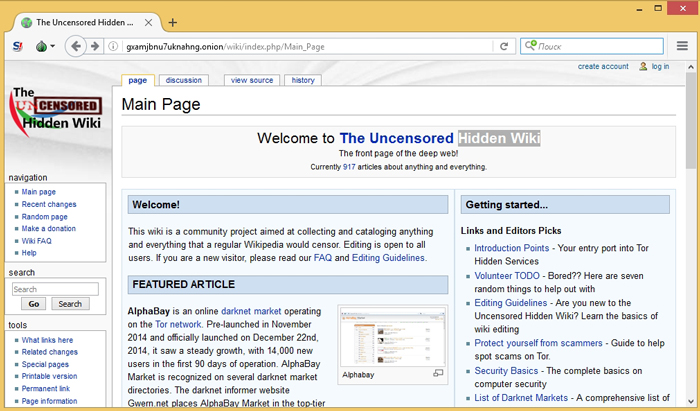
The disadvantage of the catalog can be considered that the resource provides only links to English-language sites. If desired, any user can edit the information on the pages of the hidden Wikipedia. To do this, just register.
TorWIKI Catalog
Volumetric Tor catalog consisting of 15 groups. Each individual group contains a certain number of sites. The directory of Internet resources is located at: "http://torwikignoueupfm.onion/index.php?title\u003dMain_Page".
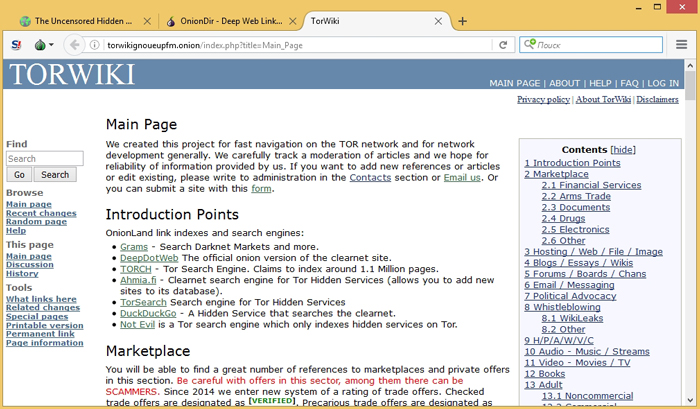
The advantage of the catalog is structuredness. Thanks to the division into themes, it is easier for the user to find information of interest to him. The disadvantage is the English language resource. It will be difficult for users who do not speak English to navigate in the catalog.
Runion Wiki Directory
A small catalog of Tor sites. The resource is located at the address: "doe6ypf2fcyznaq5.onion.cab". The developers didn’t bother with the interface. Despite this, the advantage of the catalog is that on its pages you can find Russian-language resources.
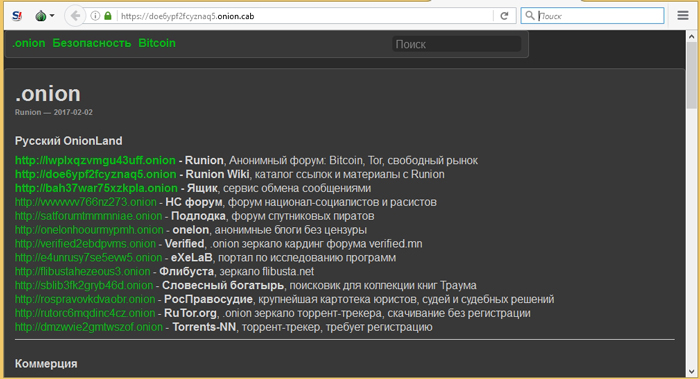
For quick search necessary resource, you can use the search located at the top of the site. It should be noted that sometimes the search does not work correctly.
OnionDir Directory
Simple in design, but containing about 200 links to hidden sites. You can get to the directory by clicking on the dirnxxdraygbifgc.onion hyperlink. On the page that opens, you will see a large number of links divided into groups.
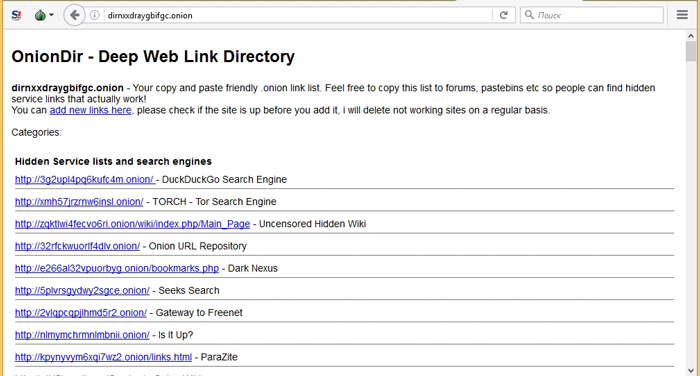
The disadvantages of the catalog include the lack of links leading to Russian-language resources. The rest of the minuses are not noticed.
Conclusion
Each user must decide for himself whether to conquer " dark internet". Especially you need to be careful when making transactions, as you can be left without money.
At first glance, it might seem that to be better google maybe only Yandex, and even that is not a fact. These companies invest huge amounts of money in innovation and development. Does anyone have a chance not only to compete with leaders, but also to win? Lifehacker's answer: “Yes!” There are several search engines that have succeeded. Let's look at our heroes.
What is it
This is a fairly well-known open source search engine. source code. Servers are located in the USA. In addition to its own robot, the search engine uses the results of other sources: Yahoo! Search BOSS, Wikipedia, Wolfram | Alpha.
The better
DuckDuckGo positions itself as a search that provides maximum privacy and confidentiality. The system does not collect any user data, does not store logs (no search history), use cookies as limited as possible.
DuckDuckGo does not collect or share user information. This is our privacy policy.
Gabriel Weinberg, founder of DuckDuckGo
Why do you need it
All major search engines try to personalize search results based on data about a person in front of the monitor. This phenomenon is called the “filter bubble”: the user sees only those results that are consistent with his preferences or that the system considers them to be.
DuckDuckGo creates an objective picture that does not depend on your past behavior on the Web, and eliminates the thematic google ads and Yandex, based on your requests. Using DuckDuckGo, it’s easy to search for information in foreign languages: Google and Yandex, by default, prefer Russian-language sites, even if the request is entered in another language.
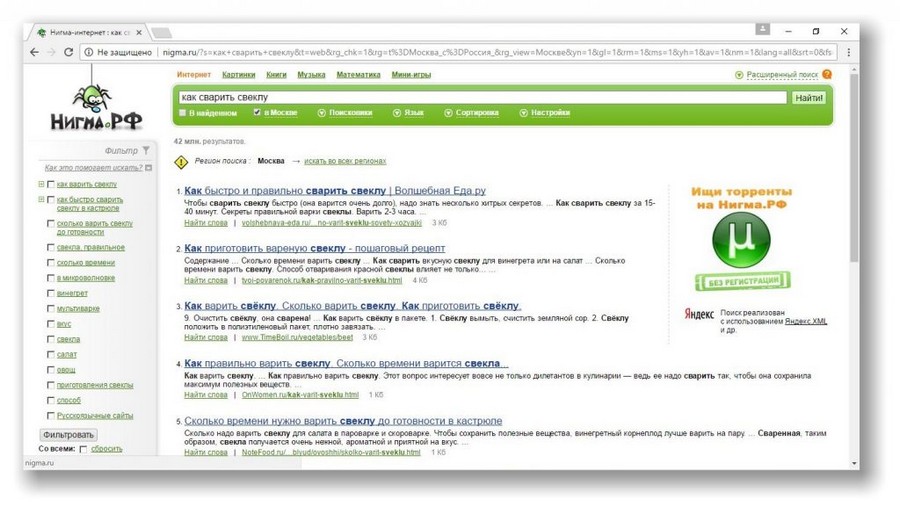
What is it
"" Is the Russian metasearch system developed by graduates of Moscow State University Viktor Lavrenko and Vladimir Chernyshov. It searches Google, Bing, Yandex and others, and also has its own search algorithm.
The better
Search by indexes of all major search engines allows you to generate relevant search results. In addition, Nigma splits the results into several thematic groups (clusters) and offers the user to narrow the search field by discarding unnecessary or highlighting priority ones. Thanks to the “Mathematics” and “Chemistry” modules, it is possible to solve mathematical problems directly in the search bar and request the results of chemical reactions.
Why do you need it
Eliminates the need to search for the same query in different search engines. The cluster system makes it easy to manipulate search results. For example, Nigma collects results from online stores in a separate cluster. If you do not intend to buy something, then simply exclude this group. By choosing the cluster “English-language sites”, you will receive the results only in English. Modules "Mathematics" and "Chemistry" will help students.
Unfortunately, the project is not developing at present, as the developers transferred their activity to the Vietnamese market. Nevertheless, Nigma has not only not yet become outdated, but in some things still gives Google a head start. Let's hope that development resumes.
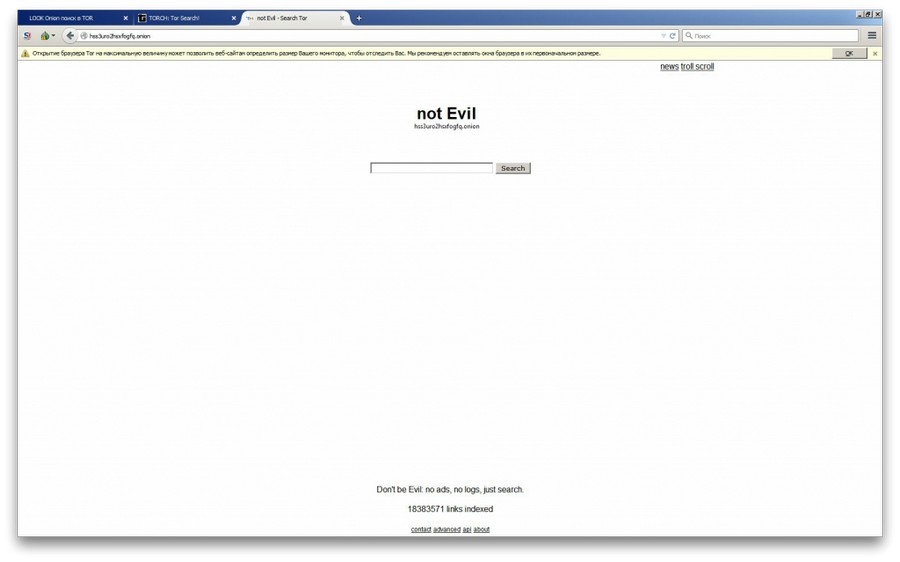
What is it
not Evil is a system that searches the anonymous Tor network. To use, you need to go into this network, for example, by launching a specialized browser of the same name. not Evil is not the only search engine of its kind. There is LOOK (the default search in the Tor browser, accessible from the regular Internet) or TORCH (one of the oldest search engines on the Tor network) and others. We settled on not Evil because of an unambiguous hint at Google itself (just look at the start page).
The better
It searches where Google, Yandex, and other search engines are barred from entering.
Why do you need it
The Tor network has many resources that cannot be found on the abiding Internet. And as the authorities tighten control over the content of the Network, their number will increase. Tor is a kind of Network within the Network: with its social networks, torrent trackers, media, trading platforms, blogs, libraries and so on.
Yacy
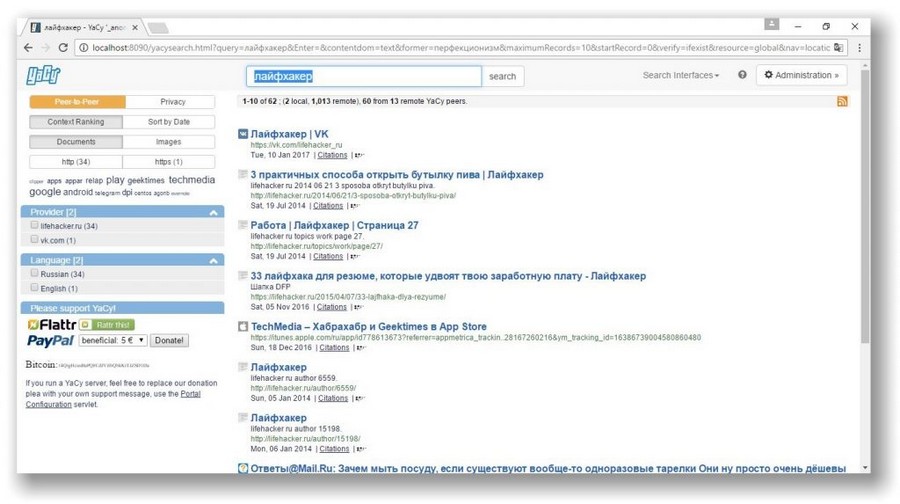
What is it
YaCy is a decentralized search engine based on the principle of P2P networks. Each computer on which the main software module is installed scans the Internet independently, that is, it is an analog search robot. The results are collected in common baseused by all YaCy members.
The better
It's hard to say here whether this is better or worse, since YaCy is a completely different approach to organizing searches. The absence of a single server and the owner company makes the results completely independent of one's preferences. The autonomy of each node eliminates censorship. YaCy is able to search deep web and non-indexed public networks.
Why do you need it
If you are a supporter of open source software and free Internet, not influenced by government agencies and large corporations, then YaCy is your choice. It can also be used to organize searches within a corporate or other autonomous network. And while YaCy is not very useful in everyday life, it is a worthy alternative to Google in terms of the search process.
Pipl
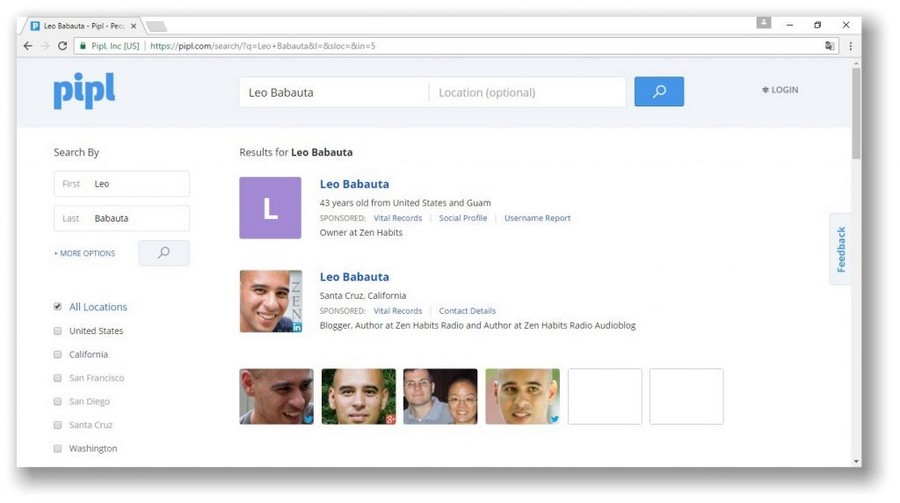
What is it
Pipl - a system designed to search for information about a particular person.
The better
The authors of Pipl argue that their specialized algorithms are more efficient than "regular" search engines. In particular, profiles are priority sources of information. social networks, comments, lists of participants and various bases data that publishes information about people, such as court decisions. Pipl's leadership in this area has been confirmed by Lifehacker.com, TechCrunch, and other publications.
Why do you need it
If you need to find information about a person living in the USA, then Pipl will be much more effective than Google. Databases of Russian ships, apparently, are not available to the search engine. Therefore, he does not cope with the citizens of Russia so well.
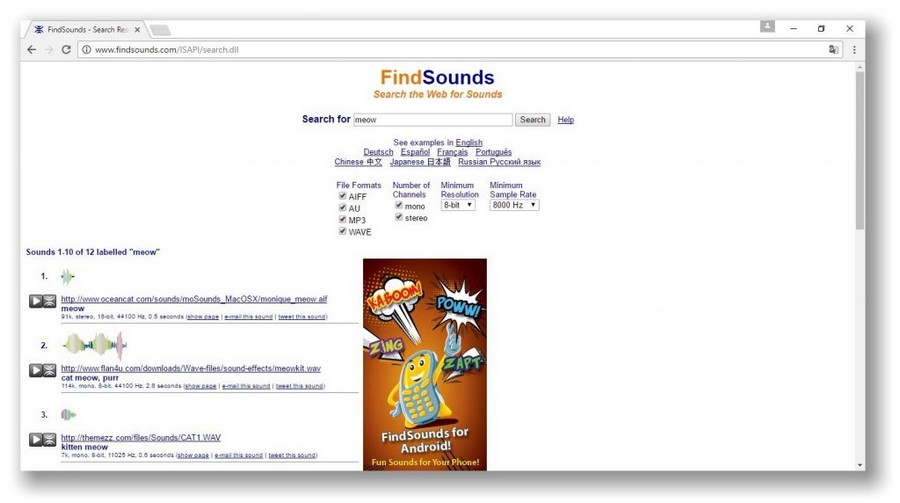
What is it
Another specialized search engine. Searches for various sounds (home, nature, cars, people and so on) in open sources. The service does not support requests in Russian, but there is an impressive list of Russian-language tags by which you can search.
The better
In the issuance of only sounds and nothing more. In the search settings, you can set the desired format and sound quality. All found sounds are available for download. There is a search for sounds in the pattern.
Why do you need it
If you need to quickly find the sound of a musket shot, the blows of a woodpecker, or the cry of Homer Simpson, then this service is for you. And I chose this only from the available Russian-language queries. On the english language the spectrum is even wider. But seriously, a specialized service involves a specialized audience. But what if it comes in handy for you?
A life alternative search engines often fleeting. About the long-term prospects of such projects, Lifehacker asked Sergey Petrenko, the former general director of the Ukrainian branch of Yandex.
As for the fate of alternative search engines, it is simple: to be very niche projects with a small audience, therefore without clear commercial prospects or, conversely, with complete clarity of their absence.
If you look at the examples in the article, you can see that such search engines either specialize in a narrow but demanded niche, which, perhaps, has not yet grown so much as to be noticeable on Google or Yandex radars, or they test the original hypothesis in ranking, which is not yet applicable in a normal search.
For example, if Tor search is suddenly in demand, that is, at least a percentage of Google’s audience will need the results, then, of course, ordinary search engines will begin to solve the problem of how to find and show them to the user. If the behavior of the audience shows that a significant share of users in a noticeable number of requests seems more relevant to the results, data without taking into account factors that depend on the user, then Yandex or Google will start to produce such results.
To be better in the context of this article does not mean to be better in everything. Yes, in many aspects, our heroes are far from Google and Yandex (even far from Bing). But each of these services gives the user something that giants in the search industry cannot offer.






